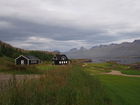Articles

The weather in Iceland 2015
The weather in 2015 was considered unfavourable, except the autumn. The winter was dominated by a series of heavy windstorms, often with snow and rain. In late April, cold and northerly winds set in and persisted until the end of August, often with heavy precipitation in the Northeast and East, but in the Southwest the weather was slightly more favourable. The autumn (September to November) was the most favourable part of the year. The year 2015 was the coldest in Iceland since 2000, but this period has generally been abnormally warm so the average temperature was close to the 1961-1990 mean. In most parts of the country, the precipitation was well above normal.
Read more
Final Conference of the SVALI project
The Final Conference of the Nordic Center of Excellence SVALI was held 4-5 June at the Ilulissat Climate Days in Greenland, focusing on the topics of changes of the Arctic and North-Atlantic land ice as well as glacier and ice cap changes, process understanding and impacts on sea level.
The Ilulissat Climate Days especially address recent, ongoing and future changes in the ice in and around Greenland, with a special focus on the effects for the Greenland society.
Read more
The weather in Iceland 2014
The year 2014 was very warm, precipitation was abundant and the sunshine duration during most of the summer was considerably below average.
In spite of the high temperatures the weather was changeable and often dull.
The first months of the year were especially wet in the North and East and the weather was difficult. In the west it was very dry at the same time with favourable weather conditions.
The summer was warm and considered fine in the North and East but in the south it was very wet and dull.
The autumn was fine, November extraordinarily warm, but the year ended with an unruly and rather cold December.
Read more
Climate change and hydrology: Environmental and societal effects
The climate and hydrology of Iceland are highly variable due to natural conditions. Significant changes in these factors over the last 15 years are in harmony with the future scenarios represented and affirmed in the latest IPCC summary report, AR5. The main purpose of IMO is to contribute towards security in society by monitoring, analyzing, interpreting, informing; providing warnings and forecasts and predicting natural hazards. It is important to keep the infrastructure strong so that IMO may fulfill its role.
Read more- The weather in Iceland 2013
- The weather in Iceland 2012
- The weather in Iceland 2011
- The weather in Iceland 2010
- The weather in Iceland 2009
- The weather in Iceland 2008
- Past temperature conditions in Iceland
- The weather in Iceland 2007
- The weather in Iceland 2006
- Early work and an overview of measurements
- The weather in Iceland 2005



